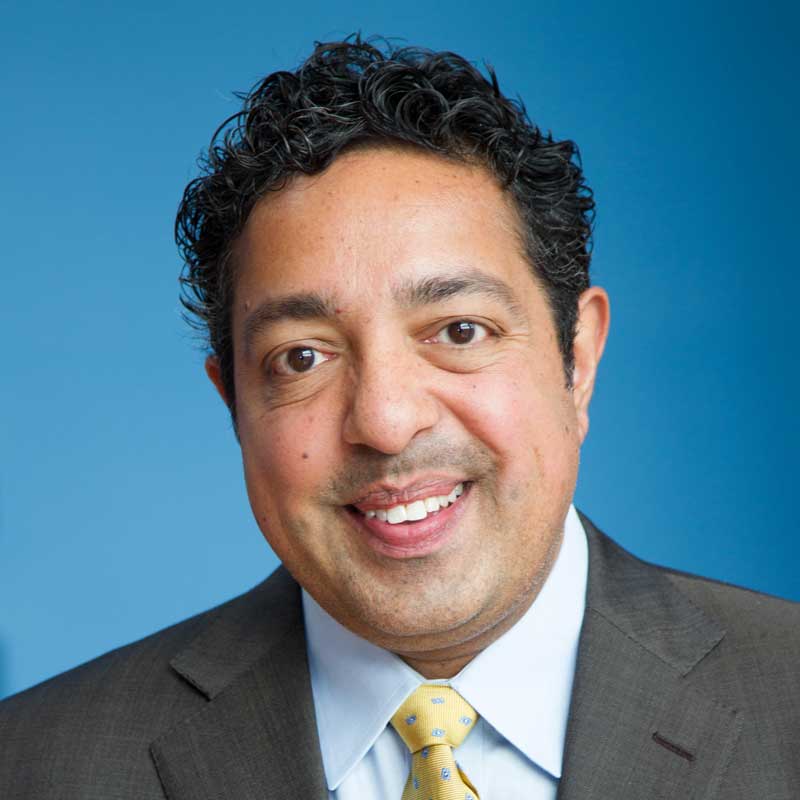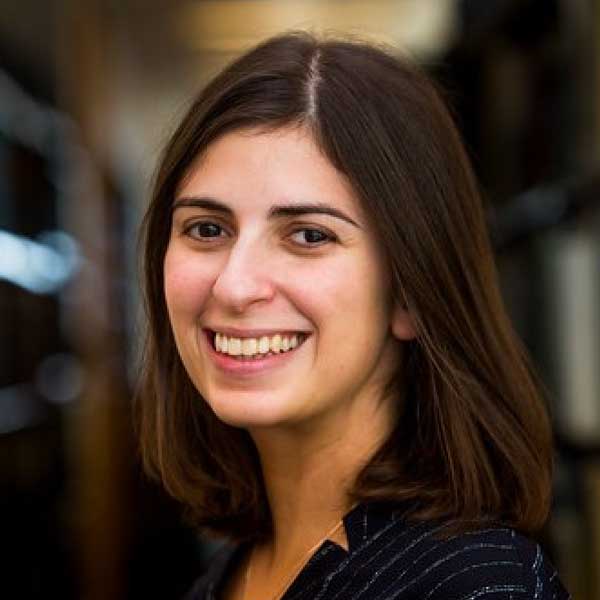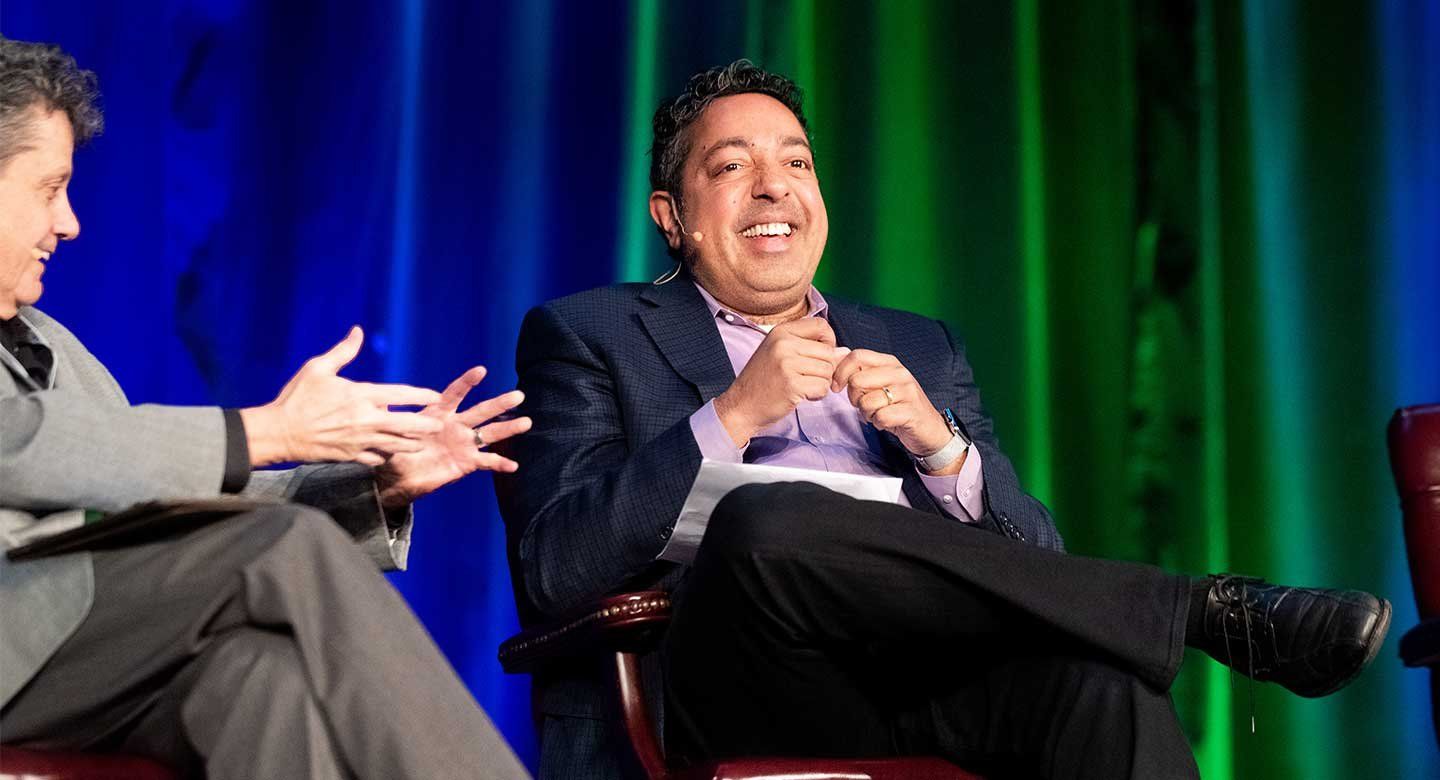State of the University Sneak Peek: Meet the Chancellor’s Exciting AI Panel
UCSF Chancellor Sam Hawgood’s State of the University address will explore the emerging frontier of artificial intelligence and its role in the future of advancing health.
Hawgood, MBBS, has invited two experts, Atul Butte, MD, PhD, and Sara Murray, MD, MAS, to join him on-stage for a first-ever AI panel discussion during his 10th annual address. In the segment, the panel will highlight the enormous potential of generative and predictive AI, and how the powerful tool set is being integrated across UCSF’s mission areas in research, education and care delivery.
As AI becomes more sophisticated, UCSF is increasingly using these new methods to increase its impact – from medical imaging and diagnostics to predictive analytics and virtual health assistance. These technological advancements are happening during a transformative time in science and health care that is changing the way diseases are diagnosed, treated and managed.
Butte believes the recent advances in AI now present the opportunity to realize its potential in advancing medicine and the health sciences in dramatic ways.
“This is the most exciting year of my career because AI took a meaningful, significant leap forward with these large language models, like GPT,” Butte said. “AI has been in medicine for many decades. How might we use these newer AI advances in medicine? That’s the question we need to ask and answer.”
Murray, who was promoted to the inaugural role of Chief Health AI Officer for UCSF Health in September, is excited about the prospects of AI.
“We are going to use AI to transform how we deliver health care at UCSF,” Murray said. “There’s a lot of optimism for how we’re going to use these tools. I want us to move quickly, but I also want us to be smart about it. We need to make sure we’re implementing tools that are safe, reliable and positively impacting patient care.”
For Butte, “mind blowing” advances in AI technology enabling large language models to interpret and understand text is just the beginning. “Much of the care we deliver in medicine is documented in text. Yes, we have pictures and signal tracings and structured data like blood test results. But now we’re talking about a software tool that actually understands that text, like admission notes and discharge notes and clinic progress notes. Of course, humans (including doctors and nurses) also understand that text. But to have a computer read that at lightning speed, we can build software that can start to understand all of our patients all at once.”
A longtime leader in data science, Butte’s research focuses on building and applying computational tools to convert hundreds of trillions of points of molecular, clinical and epidemiological data collected by researchers worldwide over the past decade, “big data,” into new diagnostics, therapeutics and insights into both rare and common diseases.
Calling UCSF “more prepared than others” in the rapidly expanding field of AI in medicine, Butte said the University is well positioned “to be among those leading the way” in AI research, development, fairness and ethics.
That will be a point of emphasis for him in the AI panel, he added.
Thanks to the work of Murray’s team, UCSF leads other institutions in developing AI infrastructure and governance, ensuring tools used in the health system are ethical and robust – with the ultimate goal of revolutionizing research and patient care.
“In the last year, the release of generative AI tools like ChatGPT have made this technology open and accessible to the public,” Murray said. “The pace at which these technologies are rapidly evolving is unprecedented. These tools have the ability to revolutionize how we deliver health care. As the medical community, we are just beginning to explore how we integrate generative AI tools into clinical practice while respecting the potential risks of these technologies.”
For Murray, that challenge means bringing “meaningful and ethical AI” to UCSF.
The 2023 UCSF State of the University address is on Thursday, Dec. 7 at 12 p.m. The Chancellor will frame his remarks around the four goals established for UCSF in 2019: cultivating partnerships, fostering financial resiliency, empowering our people and driving innovation. Tune in live or watch the address later on demand at UCSF.edu.
Meet the panelists

Atul Butte, MD, PhD
Priscilla Chan and Mark Zuckerberg Distinguished Professor of Pediatrics, Bioengineering and Therapeutic Sciences, and Epidemiology and Biostatistics at UCSF
Director, Bakar Computational Health Sciences Institute, UCSF
Chief Data Scientist, University of California Health System (UC Health)
Butte’s many credentials span two decades, with his work in biomedicine and AI earning an impressive number of awards and recognition – including this year’s William W. Stead Award for Thought Leadership in Informatics awarded by the American Medical Informatics Association.
Recruited to UCSF from Stanford University to become the Director of the Bakar Computational Health Sciences Institute and UC Health’s first chief data scientist in 2015, Butte has been elected to the American Association for the Advancement of Science (AAAS), American Institute for Medical and Biological Engineering (AIMBE), American College of Medical Informatics (ACMI) and National Academy of Medicine. In 2013, he was recognized by the Obama Administration as a White House Champion of Change in Open Science for promoting science through publicly available data.
Butte received his MD degree from Brown University, and PhD degree from Harvard Medical School and MIT.
Butte, who encourages young scientists to become entrepreneurs, is co-founder of three investor-backed, data-driven companies: Personalis, Carmenta and NuMedii. A prolific author and popular speaker, Butte has presented his work at hundreds of meetings including the National Institutes of Health, the Precision Medicine World Conference and TEDMED.
Hear more details about Butte’s distinguished career on the NEJM AI Ground Rounds podcast.

Sara Murray, MD, MAS
Vice President, Chief Health AI Officer for UCSF Health
Associate Chief Medical Information Officer, UCSF Health
UCSF associate professor of clinical medicine
Reporting to Mark Rauschuber, CIO for UCSF Health, Murray is responsible for developing the overall strategy and vision for the use of AI in the UCSF Health care setting, overseeing governance of AI, and assisting in the establishment of health system priorities around AI and the implementation of approved technologies in the health care setting.
Her extensive background at UCSF includes previous work as a strategic health system leader for clinical informatics, digital health and data science. Before that, Murray earned her BS degree in Chemistry at the College of William & Mary, and earned her MD and MAS (clinical research) degrees from UCSF. She later joined the UCSF Division of Hospital Medicine as faculty in 2015 and is part of the new UCSF Division of Clinical Informatics and Digital Transformation (DoC-IT) where she serves as Associate Chief for Health System Partnerships.
